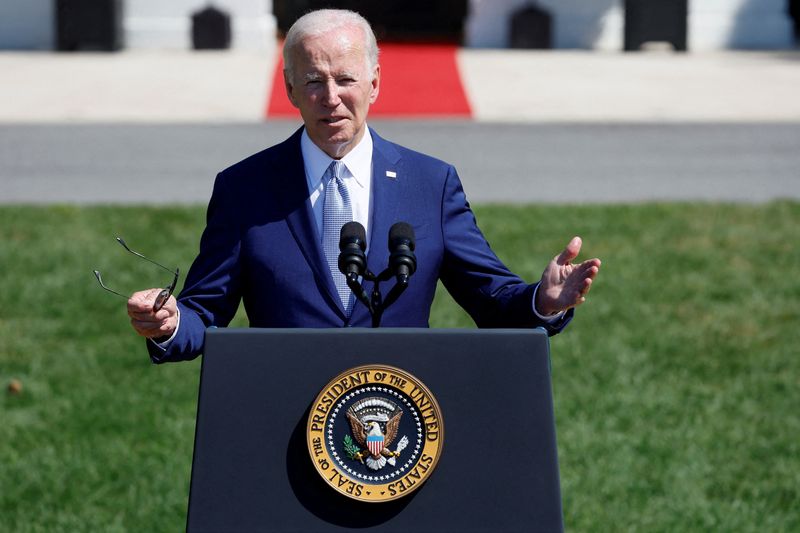Biden plans to bar some U.S. investments in China, track others -sources
Reuters
Published Feb 10, 2023 12:44PM ET
Updated Feb 10, 2023 08:30PM ET

By Karen Freifeld and Alexandra Alper
WASHINGTON (Reuters) -The Biden administration plans to outright ban investments in some Chinese technology companies and increase scrutiny of others, three sources said, part of its plan to crack down on the billions that American firms have poured into sensitive Chinese sectors.
The ban is expected to apply to some investments tied to chip production, two of the sources said. The upcoming rules are likely to track sweeping new restrictions the U.S. placed on exports of American artificial intelligence (AI) chips, chipmaking tools, and supercomputers, among other technologies, to China in October, sources also said.
The plan will be laid out in an executive order the White House is expected to unveil in the coming months. China hawks in Washington blame American investors for transferring capital and valuable know-how to Chinese tech companies that could help advance Beijing's military capabilities.
The White House declined to comment.
"No restriction or repression can stop the pace of China's scientific and technological development," a spokesperson for the Chinese Embassy in Washington said in a statement. "The U.S. politicians' unwarranted restrictions on normal trade and economic cooperation between China and the U.S. will only ...miss development opportunities."
Relations with China have soured after one of its surveillance balloons was spotted over the United States, prompting China watchers to anticipate more punitive measures from Washington against Beijing in the short term. That could include the long-awaited outbound investment order.
In addition to the ban on some investments, a broad swathe of transactions would be considered "notice and go," requiring the investors to simply advise the government of their plans, with no risk of disapproval.
The Biden administration would give industry a chance to weigh in on proposed rules before the plan took effect, a source said.
While details of the order could change, the tiered approach shows the Biden administration is trying to take a scalpel to controlling U.S. investments in China after its unilateral roll-out of the October export curbs on China angered allies and U.S. firms.
It also illustrates the government's desire for more information on U.S. investment in Chinese tech startups. A report by a Georgetown University think tank earlier this month showed U.S. investors including the investment units of chipmakers Intel Corp (NASDAQ:INTC) and Qualcomm (NASDAQ:QCOM) Inc accounted for nearly a fifth of investments in Chinese AI companies from 2015 to 2021, transactions valued at $40.2 billion.
The executive order, previously expected for the fourth quarter of last year, was further delayed in part to avoid antagonizing Beijing ahead of Secretary of State Antony Blinken's planned February trip to China. That trip was later postponed because of the Chinese spy balloon.
National security adviser Jake Sullivan first flagged the issue in July 2021 when he said outbound U.S. investment flows into Chinese technology might harm national security and undermine export controls.

Peter Harrell, a White House official who left the administration late last year, told a House of Representatives committee earlier this week that he "strongly" recommended the government establish "a narrowly tailored regime" requiring disclosure of investments in certain key Chinese technologies with the ability to "limit or block the small number of transactions that are likely to raise serious national security risks."
Efforts to incorporate an outbound investment screening plan in legislation failed last year in Congress. However, a spending bill signed into law in December gave the U.S. Departments of Treasury and Commerce $10 million each to identify what it would take to implement a program to address national security threats from "outbound investment" in certain sectors. Their reports are due later this month.
Written By: Reuters
Trading in financial instruments and/or cryptocurrencies involves high risks including the risk of losing some, or all, of your investment amount, and may not be suitable for all investors. Prices of cryptocurrencies are extremely volatile and may be affected by external factors such as financial, regulatory or political events. Trading on margin increases the financial risks.
Before deciding to trade in financial instrument or cryptocurrencies you should be fully informed of the risks and costs associated with trading the financial markets, carefully consider your investment objectives, level of experience, and risk appetite, and seek professional advice where needed.
Fusion Media would like to remind you that the data contained in this website is not necessarily real-time nor accurate. The data and prices on the website are not necessarily provided by any market or exchange, but may be provided by market makers, and so prices may not be accurate and may differ from the actual price at any given market, meaning prices are indicative and not appropriate for trading purposes. Fusion Media and any provider of the data contained in this website will not accept liability for any loss or damage as a result of your trading, or your reliance on the information contained within this website.
It is prohibited to use, store, reproduce, display, modify, transmit or distribute the data contained in this website without the explicit prior written permission of Fusion Media and/or the data provider. All intellectual property rights are reserved by the providers and/or the exchange providing the data contained in this website.
Fusion Media may be compensated by the advertisers that appear on the website, based on your interaction with the advertisements or advertisers.